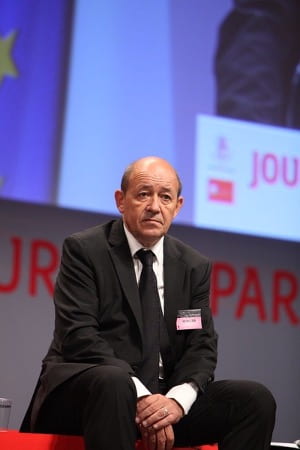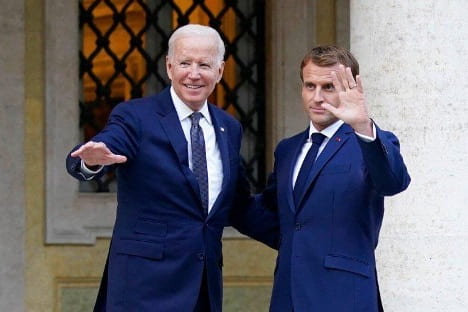By Jesse Tanson, MA International Affairs ’22
The AUKUS incident between France, the United States, and Australia occurred due to a contract breach between Australia and France. Australian authorities had contracted France to develop shortfin barracuda submarines to meet its maritime defense needs in 2016 for $38.6 billion. As the deal was delayed and costs increased, the Australian government decided to opt for American-built submarines because they have nuclear capabilities. The abandonment of the deal provoked the removal of the French ambassador to the United States, a first in the history of the Franco-American relationship. Ambassador Etienne returned to Paris for a brief period before returning to his post. The event prompted conversations about alliances and France’s role in the world.
France in the U.S.’ world?
The projection of power was key to the formation of modern France. As an empire, France saw its power expand throughout the world and the country was synonymous with influence.
Until WWII, France saw itself as a world power, influential militarily and culturally. However, its leadership in the world waned as the United States became the world superpower following WWII when the US helped the French fight the Germans, hurting Paris’ pride. Furthermore, the U.S. had obtained nuclear weapons and spread its culture globally, ousting France from the top position. To reclaim its identity as a top contender in a U.S.-dominated world, France developed its own nuclear arms program. In other words, Charles de Gaulle saw it necessary for France to arm itself with nuclear weapons to reassert its dominance in the new world order.
Similarlyfor President Macron, nuclear power is equal to French world leadership. Macron announced a nuclear buildup of 14 generators to reduce carbon emissions and reliance on foreign energy, namely from Russia. Now France also hopes to best the United States and China in the nuclear power race. If France can become Europe’s top nuclear power producer, it can position itself as a worthy adversary of the United States.
Paris still holds onto its former colonies as trade partners, but increased Chinese involvement in the region may drive away French business. The AUKUS deal represented another defeat to French power, prompting it to react strongly. Paris needed to show resolve in the face of its people, Europe, and the world.
A stab in the back?

French Minister of Foreign Affairs Yves Le Drian (Community Commons)
The immediate ending of the $38.6 billion deal shocked the world, not least of all the French. French Minister of Foreign Affairs Yves Le Drian called the dropping of France in the deal “a stab in the back.” Following a conversation with the Australian Prime Minister, President Macron alleged that he was lied to about the failed submarine deal. The U.S. actions attacked France’s falling self-image. The deal demonstrated to France that it would be a second-choice partner, behind the United States. As it struggled to reclaim its lost glory, France found its plans thwarted by U.S. enterprise. Furthermore, the failure of the deal demonstrates the American hegemony against which France has fought for several decades. In France’s view, the United States violated norms in pursuit of its interests, slighting its European allies in favor of its Anglophone partnerships. The submarines France intended to sell to Australia were non-nuclear, per agreements to half nuclear proliferation. From this perspective, France sees the United States as violating agreements established by democracies with shared values. Thus the AUKUS deal struck to the heart of France’s identity of a nuclear power with global trade ambitions.
A Simple Mistake?
The AUKUS deal represented a breach of trust for the French and larger European community, an opportunity to better arm itself for Australia, and another means to secure the indo-pacific for the United States. To resolve the issue, President Joe Biden met with President Emmanuel Macron. The two heads of state addressed the deal, with the American leader referring to the turn of events as “clumsy.” President Biden claimed that he was under the impression that France was aware of the switching of clients. The difference in perspective reveals differences in the larger identity narratives of the two countries. France’s concern was its image as a world power, which has dwindled in recent history. The deal, for France, would have returned lost prestige to the country. France falls behind the United States and Russia as the third-largest weapons exporter globally. The United States, possessing the title of the world’s greatest superpower, merely acted in line with its own identity; it sought to ensure security. The fact that France was caught in crossfires was a blunder, as President Biden explained.

US President Biden and French President Macron (AP Photo)
Reinforced Cooperation?
Though the AUKUS affair ended with the return of French Ambassador Etienne and the two sides found an agreement, what would this mean for France? France successfully defended itself against the United States and was successful in obtaining an admission of guilt from the American president.
For more on the topic by the author, please click here.
The opinions expressed in this blog are those of the author. They do not express the views of the Institute for Public Diplomacy and Global Communication or the George Washington University.

Jesse, I think you did a great job in explaining France’s concern for its image related to the cancellation of the deal between Australia and France. You highlighted some issues that hardly received coverage in the U.S. papers including that the original deal was adhering to agreements to reduce nuclear proliferation. A lot of what I saw emphasized that Australia was looking to have nuclear capable submarines where the French made ones were not going to be. Your piece has made me reconsider how much I knew about this issue, based on how it was framed in U.S. media, and was very informative in providing more details.
As you explained, France was very concerned with its image in relation to the U.S. but since the U.K. also played a role in this, was France worried about their standing among European nations in relation to the U.K? I see a lot of anger from France being directed at the U.S. but the U.K played a role in the new deal that was reached too. Also, do you feel like the U.S. actually gave an admission of guilt or was it framed that way by the French? Some of what I saw made it seem like Biden was saying it wasn’t on us to tell you, it was on Australia and we’ll do better communicating going further. Do you feel like the French framed it as an admission of guilt to fit within the narrative they were trying to use? I’d be interested in your thoughts on that.
Jesse, I agree with your submission in this writeup that France’s identity narrative through the failed AUKUS deal was fractured. This piece takes us through the journey of Frances’s identity as you successfully sketched both the master and identity narrative of France as a former super-powered whose identity would have been reinforced with the successful execution and delivery of the Australian submarine. It will have without doubt announced to the world that France is back as a technological superpower! The many system ties between the US and France as allies and members of NATO should have sufficed at the least during the AUKUS deal, but unfortunately, it did not.
However, my position is that since the US has been effective at using France’s identity and system narrative to appeal to its identity, both the French and the US governments have been able to find valuable common ground to nurture and continue their relationship. The end of such hostility and war of narrative is what we all witnessed with the return of Ambassador Etienne back to Washington. The successful use of strategic narratives to convince France by the Biden administration is quite instructive.
Hi Jesse – This is a wonderfully analyzed history of French influence juxtaposed with growing American power since pre-WWII This gave important context to the mishaps of the AUKUS deal and France’s strong response. You provide crucial research on key moments of shifting power dynamics that contextualize the French withdrawal of their ambassador in a way that fits perfectly into a decades-long narrative of receding French influence in the face of an expanding global superpower.
I would be interested in your analysis of how France could leverage system narratives to expand the perception of its power among global military powers like the US? You could expand on finding overlapping narratives and providing recommendations for how French leadership should communicate its military capabilities with an international audience.
Jesse – you did a great job simplifying this issue for people who are not advanced in this topic. I appreciate your thoughtfulness. The context that you gave to why the deal failed, and how France is impacted, is greatly insightful and the history is necessary in explaining why everything happened the way that it did. I really like Alexia’s question: “I would be interested in your analysis of how France could leverage system narratives to expand the perception of its power among global military powers like the US?” and am interested in hearing your answer. This would be a great aspect to expand upon in the paper.
I think the aspects you chose to explore in relation to France’s international power and positioning are really interesting, particularly the nuclear aspect. I also like how you continued to highlight the tension between the US and France, such as referring to France as a “second-choice partner” and detailing how the US quickly surpassed France in terms of nuclear might. It was powerful to then end the blog by saying France was successful in getting the US to admit its wrongs. The framing of France as a country that is trying to amplify its prestige and return to a place of being a stronger world leader tied the country’s history nicely into the current story. Are there specific ways that you think France could spread their culture more globally? The visual you used of Biden and Macron highlighted your argument further, as the distance between the two leaders is physically obvious.
You did a really nice job illustrating France’s master narrative and how Australia’s decision to abandon the deal fractured France’s identity, and bruised their ego. I think you captured what made this event controversial enough for an ambassador to leave his post, but it also may have been worth noting that the deep roots of the US-French alliance — spanning back to the Revolutionary War — to emphasize the unprecedented nature of the schism between the two nations. Like Alexis said, the narrative in US media has been centered around French anger towards the US, but how has this impacted their relationship with the UK? Has that also been reflected in French media?